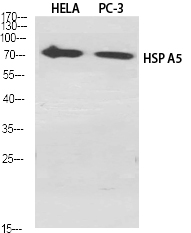
| WB | 咨询技术 | Human,Mouse,Rat |
| IF | 咨询技术 | Human,Mouse,Rat |
| IHC | 1/50-1/100 | Human,Mouse,Rat |
| ICC | 1/50-1/200 | Human,Mouse,Rat |
| FCM | 咨询技术 | Human,Mouse,Rat |
| Elisa | 1/10000 | Human,Mouse,Rat |
| Aliases | HSPA5; GRP78; 78 kDa glucose-regulated protein; GRP-78; Endoplasmic reticulum lumenal Ca(2+)-binding protein grp78; Heat shock 70 kDa protein 5; Immunoglobulin heavy chain-binding protein; BiP |
| Entrez GeneID | 3309 |
| WB Predicted band size | Calculated MW: 72 kDa; Observed MW: 75 kDa |
| Host/Isotype | Rabbit IgG |
| Antibody Type | Primary antibody |
| Storage | Store at 4°C short term. Aliquot and store at -20°C long term. Avoid freeze/thaw cycles. |
| Species Reactivity | Human,Mouse,Rat |
| Immunogen | Synthetic peptide from human protein at AA range: 505-570 |
| Formulation | Purified antibody in PBS with 0.05% sodium azide,0.5%BSA and 50% glycerol. |
+ +
以下是3篇关于GRP78/BiP抗体的经典文献参考(名称、作者、摘要概括):
1. **文献名称**:GRP78/BiP is required for cell proliferation and protecting the inner cell mass from apoptosis during early mouse embryonic development
**作者**:Lee AS等
**摘要**:研究利用GRP78抗体揭示该蛋白在小鼠胚胎早期发育中的关键作用,证明其通过抑制内质网应激保护细胞存活,并调控胚胎干细胞增殖。
2. **文献名称**:Endoplasmic reticulum chaperones GRP78 and calreticulin prevent oxidative stress, Ca²⁺ disturbances, and cell death in neuronal cells
**作者**:Ni M等
**摘要**:通过免疫印迹和免疫荧光(使用GRP78抗体),证明GRP78在神经元中抵抗氧化应激,维持钙稳态,并减少内质网应激诱导的细胞凋亡。
3. **文献名称**:The endoplasmic reticulum chaperone GRP78/BiP is required for mutant SOD1-induced neurotoxicity
**作者**:Reddy RK等
**摘要**:利用GRP78抗体发现该蛋白在肌萎缩侧索硬化症(ALS)模型中的异常表达,其与突变SOD1蛋白相互作用并加剧神经退行性病变。
4. **文献名称**:Surface expression of GRP78 enhances pancreatic adenocarcinoma cell malignancy
**作者**:Zhang Y等
**摘要**:通过流式细胞术和免疫组化(使用GRP78抗体),揭示细胞膜定位的GRP78促进胰腺癌细胞迁移、侵袭及化疗耐药,提示其作为癌症治疗靶点。
GRP78. also known as BiP (Binding Immunoglobulin Protein), is a member of the heat shock protein 70 (HSP70) family that resides primarily in the endoplasmic reticulum (ER). It serves as a central regulator of ER homeostasis by acting as a molecular chaperone, facilitating the folding and assembly of newly synthesized proteins, and targeting misfolded proteins for degradation. During ER stress, GRP78/BiP dissociates from transmembrane sensors like PERK, IRE1α, and ATF6. activating the unfolded protein response (UPR) to restore cellular balance or initiate apoptosis if stress persists.
Antibodies targeting GRP78/BiP are critical tools for studying its expression, localization, and function in both physiological and pathological contexts. Researchers use these antibodies in techniques such as Western blotting, immunohistochemistry, and immunofluorescence to investigate GRP78/BiP’s role in diseases like cancer, neurodegenerative disorders (e.g., Alzheimer’s, Parkinson’s), diabetes, and viral infections. In cancer, GRP78/BiP is often overexpressed in tumors, where it promotes cell survival, drug resistance, and metastasis, making it a potential therapeutic target. Its dual role in pro-survival signaling and stress adaptation underscores its importance in cellular stress pathways.
GRP78/BiP antibodies also aid in exploring its interactions with viral proteins, as some pathogens exploit ER chaperones for replication. These antibodies are essential for advancing our understanding of ER stress mechanisms and developing targeted therapies.
×